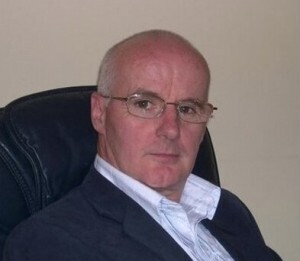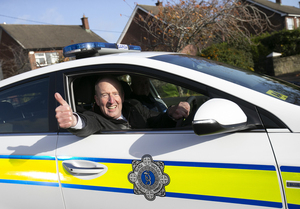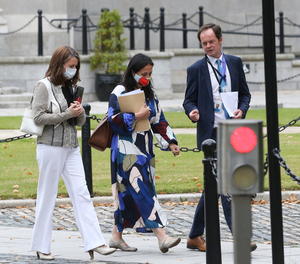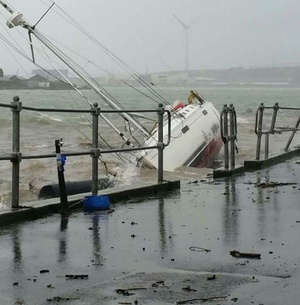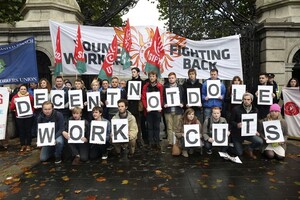
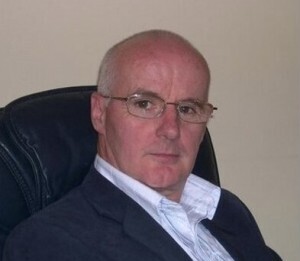 From top left to right: Whistleblower Chay Bowes, Michael Smith, editor, Village magazine and John Tye, Founder & Chief Disclosure Officer of Whistleblower Aid at the Web Summit in Lisbon, Portugal in November; Anthony Sheridan
From top left to right: Whistleblower Chay Bowes, Michael Smith, editor, Village magazine and John Tye, Founder & Chief Disclosure Officer of Whistleblower Aid at the Web Summit in Lisbon, Portugal in November; Anthony Sheridan
Please note, although this controversy occurred over a month ago and was the subject of an excellent article by Vanessa Foran, I believe the hostile reaction by mainstream media to anti-corruption campaigning deserves as much coverage as possible.’
On November 6, Irish Examiner journalist Michael Clifford wrote an article that can only be described as gutter journalism at its very worst.
The target of Clifford’s attack was entrepreneur and anti-corruption campaigner Paddy Cosgrave.
Cosgrave is co-founder of the hugely successful Web Summit and used that platform at this year’s event to highlight very serious allegations of corruption against then Taoiseach Leo Varadkar.
The allegations, published by Village magazine, claims that Varadkar illegally leaked a confidential document related to negotiations for a new General Practitioner contract. The allegations are so serious that Varadkar is now the subject of a criminal investigation.
Cosgrave brilliantly used the event, attended by 43,000 people from 128 countries, to expose to the world the rot that lies at the heart of Ireland’s governance.
After projecting a giant image of the Village Magazine cover that described Mr. Varadkar as a ‘law breaker’, Cosgrave invited the whistleblower, Chay Bowes and the editor of the magazine, Michael Smith, onto the stage.
Clifford focused his attack on Cosgrave and whistleblower Bowes. He openly questioned Bowes integrity by comparing his courage to the guest of honour at the event, Facebook whistleblower Frances Haugen.
‘To present the whole farrago as an introduction to Ms Haugen, a genuine, courageous whistleblower, was arguably insulting to her.’
Clearly, Clifford does not believe that Bowes is a genuine whistleblower despite the fact that his revelations triggered a criminal investigation into the then prime minister of our country.
The journalist then attacked Cosgrave by inaccurately claiming he linked the notorious activities of Weinstein and Epstein with Varadkar’s alleged crime.
Clifford wrote:
‘To leave open the possibility to an uninformed audience that whatever he did could be bracketed in notoriety with the activities of Weinstein and Epstein is contemptible.’
Clifford then, hypocritically, did exactly what he had just [falsely] condemned Cosgrave of doing. He linked the notorious journalist, Gemma O’Doherty with Cosgrave’s actions.
‘Once upon a time, Gemma O’Doherty held a similar role in the public square before she took a sharp turn to the right. There is no reason in the world to believe that Paddy would follow her but you have to wonder what exactly he will do next.’
So why the hypocrisy, why would Clifford insult and condemn one whistleblower and his supporter and praise another?
The answer, I believe, depends on who the whistleblower is and who they are exposing.
Ms. Haugen is an American citizen, she’s an outsider. Her whistleblowing poses no threat to those who rule the roost in Irish politics.
But, in the eyes of an establishment journalist like Clifford, Cosgrave’s relentless and effective anti-corruption campaigning is a direct threat to the power of the ruling political class that he and his newspaper so strongly support.
And Clifford himself, helpfully, provides the evidence for the truth of this claim.
In defence of Varadkar he writes:
‘He [Varadkar] was stupid rather than corrupt and he may have broken the law but there was no personal gain in it for him.’
If it was just a case of stupidity on Varadkar’s part then surely we can expect the Gardai to drop their criminal investigation now that this journalist has delivered his judgement on the case?
It also appears that Clifford does not believe that political corruption is a crime. How else can we reconcile his view that ‘Varadkar may have broken the law but he’s not corrupt’?
Even more bizarre, particularly for a journalist, is Clifford’s suggestion that there should be no accountability if there was no personal gain in the crime.
But Clifford doesn’t operate alone in the establishment media bubble. Political editor of the Examiner, Daniel McConnell expressed similar views in defence of that other stalwart of the political establishment, Simon Coveney, during the Zappone cronyism scandal.
‘Coveney is not a crooked politician,’ McConnell told the nation adding –
‘The true scandal here has been Coveney and Fine Gael’s utter failure to kill this off long before now.’
Here we have a journalist, the political editor of one of the most influential newspapers in the country suggesting that the ‘killing off’ of a serious scandal involving cronyism and possible law breaking should take precedence over political accountability.
I wrote before about the disturbing malaise that’s eating away at standards in Irish journalism. Clifford’s intemperate and biased rant is a particularly nasty example of that malaise.
Anthony Sheridan is a freelance journalist and blogs at Public Enquiry.
Previously: Vanessa Foran: A Reckoning At The Summit
Pic: Web Summit







